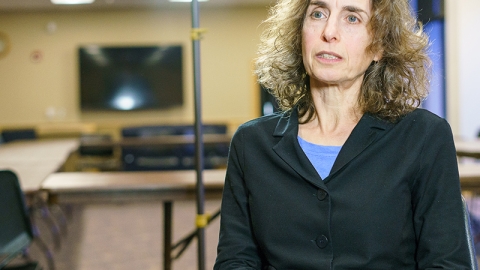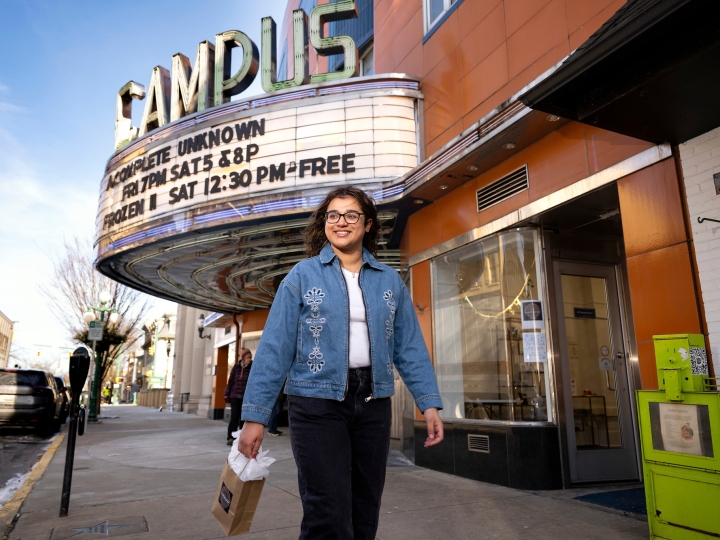
Life in the Denial Sphere
April 16, 2016
Elizabeth Kolbert is the 12th Janet Weis Fellow in Contemporary Letters.
Weis Fellow Elizabeth Kolbert discusses the challenges of altering opinions on climate change
Bucknellians had the opportunity to hear a talk by Elizabeth Kolbert, author of The Sixth Extinction: An Unnatural History Jan. 27 in the Weis Center for the Performing Arts. Bucknell Magazine Associate Editor Matt Hughes sat down with the 12th Janet Weis Fellow in Contemporary Letters before her formal lecture.
Your book has a provocative title. What do you mean when you say, the sixth extinction?
The sixth extinction is definitely not my invention — it's not my phrase. A course has been taught here at Bucknell called the sixth extinction for 10 years, I was told, so it's been around for a while. The obvious implication is that there were five other mass extinctions, which [occurred during] the last half-billion years. The sixth extinction is this extinction event, or diversity crisis, that's occurring right now and that could potentially rise to the level of the great mass extinctions of the past. If you want a view of what one of them is like, think back to the asteroid impact that did in the dinosaurs about 66 million years ago — that was the last great mass extinction.
Your book begins by recapping those five previous mass extinctions, as well as scientists' historical attempts to understand extinction. How does that context help us understand what's happening today?
The reason the book contains a lot of the background on the previous five mass extinctions is, in part, to give people a sense of what's at stake. It's also, to be honest, just because it's a really interesting aspect of natural history that people just in the last few decades have spent a lot of time trying to understand.
One of the reasons that mass extinctions were not even acknowledged until the past several decades is that Charles Darwin and his mentor, Charles Lyell, really didn't believe that they could exist, even though, in the 1850s, there was a lot of evidence that they did exist. They both rejected that evidence. It wasn't until very recently that geology and paleontology broke free from that model and said, "We have to look at the evidence. There really are these crises in the history of life and they have shaped life." They are why you and I are sitting here today as opposed to a pair of dinosaurs.
Are you concerned about those who still have not acknowledged that this seems to be happening again, especially those in Congress?
I am. People often ask me, are you optimistic or pessimistic? I answer pretty frankly that I'm pessimistic and one of the factors that I put into that equation is the makeup of Congress and the fact that they seem to exist in their own little world, one completely and almost increasingly, divorced from reality. And that's true in many state houses as well.
I think change is possible. I think everyone can change. I think people who are in the denial sphere now may have an awakening, or maybe their successors will. But it's hard to look at American politics right now and say, "Oh, we're on the cusp of some meaningful action."
But there has been some action at the global level: The U.N. just completed a round of climate talks in Paris. Do you think the outcome of those talks is a step in the right direction, or is it a case of too little, too late?
I think both — they’re not mutually exclusive. And I think even the most positive, boosterish interpretation would say that: It’s a step in the right direction, but it’s not enough. One of the actual provisions of the Paris Accord is that countries come back every several years and re-evaluate and … strengthen, their commitments, because it was realized by the people who negotiated the accord that it was inadequate. So we will see what happens over the next several years in terms of fulfilling those commitments and then we’ll see what happens when people come back to the table.
You concede in your first chapter that you've taken on a topic that is "massively morbid," yet you also titled your last chapter "The Thing with Feathers," a poetic allusion to hope. Is there hope in this book?
That was a joke — I was playing with that wonderful Emily Dickinson line. In fact, the thing with feathers is also an allusion to a bird, which is the main character of the last chapter. I was really attempting to play with this expectation that environmental books always end on this note of, "Oh well, this is a terrible problem, the world's coming to an end, but if you just do X or Y…" I was trying to deal with those expectations and have some fun with it but also, in a very serious way, ask the question, why even read this book if you're not going to end with 10 things that you can do?
So what can people, especially young people, do to make a difference?
They can get out there and vote and they can also make noise. Small groups of people in this country make a big difference, because they care about one issue and they really pester and they really make a stand. I think that climate change, which is an issue that my generation is going to hand off to our kids' generation, is an issue that young people should be absolutely on the streets about. I always urge young people to do that. If young people voted on this issue, you would see a change in American politics, because American politics responds to American voters. Ultimately it does.

